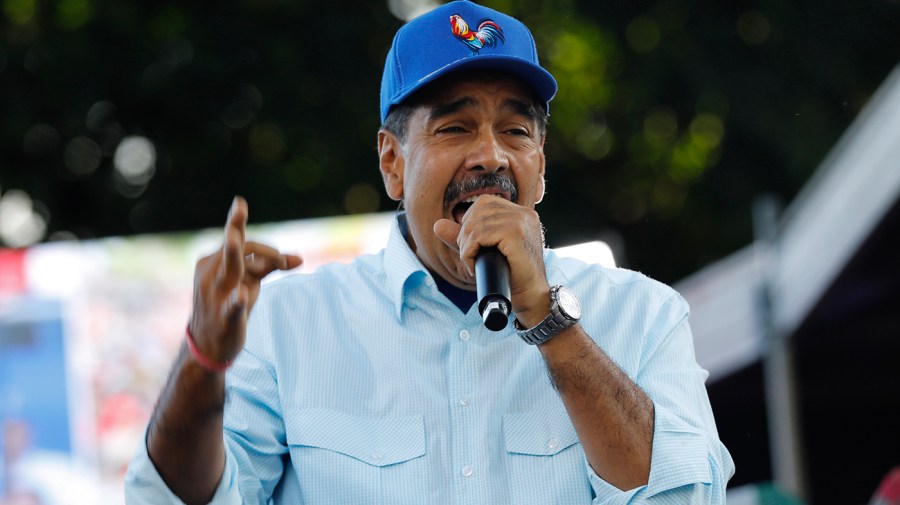
The Biden administration announced a slew of new sanctions against allies of Venezuelan President Nicolás Maduro in opposition to his claim of election victory, calling his Friday inauguration “illegitimate” and a “desperate attempt to seize power.”
Maduro was sworn in as president of Venezuela on Friday by National Assembly leader Jorge Rodríguez, expanding the rift between the country’s de-facto government and foreign powers who explicitly question its legitimacy.
The U.S. is increasing its rewards for justice to $25 million for information leading to Maduro’s arrest or conviction, and that of his minister of interior, Diosado Cabello.
A $15 million reward is also being offered related to Defense Minister Vladimir Padrino López, part of criminal narco trafficking indictments announced in March 2020.
The U.S. is also sanctioning eight Venezuelan officials leading key economic and security agencies; blacklisting high-level military and police officials involved in repression and human rights abuses against democratic actors; and imposing visa restrictions on “Maduro-aligned individuals” identified as undermining the electoral process or acts of repression in Venezuela.
“The Venezuelan people and world know the truth — Maduro clearly lost the 2024 presidential election and has no right to claim the presidency,” Secretary of State Antony Blinken said in a statement.
“The United States rejects the National Electoral Council’s fraudulent announcement that Maduro won the presidential election and does not recognize Nicolás Maduro as the president of Venezuela.”
President Biden and members of Congress met last week with Venezuelan opposition figure Edmundo González Urrutia, whom the U.S. recognized in November as president-elect.
In his statement, Blinken said González Urrutia should be sworn in “and the democratic transition should begin.”
But Maduro, who was sworn in with Cuban President Miguel Díaz-Canel and Nicaraguan President Daniel Ortega in attendance, has shown no signs of seeking to relinquish power in the South American nation.
Venezuelan officials proclaimed Maduro the winner of the July 2024 election, claiming he had won slightly more than half the votes cast.
Foreign observers panned Maduro’s official numbers, which were presented in a haphazard fashion after regular polling reports were interrupted by officials after the election.
Most international analysts have concluded that the opposition’s figures, though incomplete, are accurate: The opposition claims González Urrutia won 67 percent of the vote to Maduro’s 30 percent.
In his statement, Blinken announced increased sanctions against Maduro and officials surrounding him, including $25 million rewards for information leading to the arrests of Maduro and Minister of the Interior Diosdado Cabello, and a new $15 million reward for information leading to the arrest or conviction of Defense Minister Vladimir Padrino.
Florida Reps. Mario Díaz-Balart (R) and Debbie Wasserman Schultz (D) led a bipartisan group on Friday to introduce legislation that would juice Maduro’s bounty up to $100 million, funded by seized Venezuelan assets.
GOP Sens. Rick Scott (Fla.), Ted Cruz (Texas) and Bill Cassidy (La.) introduced a companion bill in the upper chamber.
“Today, Maduro has made a mockery of democracy and the rule of law by anointing himself as President. His regime is a criminal enterprise that fuels narco-terrorism, suppresses independent media, and violates human rights with impunity. Recently, it has intensified violence against the Venezuelan people and leaders of the opposition,” said Díaz-Balart in a statement.
Opposition leader María Corina Machado, who was banned from competing in July’s election, was briefly detained amid protests in Caracas on Thursday, allegedly by regime forces.
Both sides of the U.S. political spectrum are united in opposition to Maduro, who previously lost international recognition after allegations of fraud in the 2018 presidential election.
President-elect Trump also voiced support for González, and Venezuelan democracy activist Maria Corina Machado, writing on his site Truth Social that they are “peacefully expressing the voices and the WILL of the Venezuelan people with hundreds of thousands of people demonstrating against the regime.”
“The great Venezuelan American community in the United States overwhelmingly support a free Venezuela, and strongly supported me. These freedom fighters should not be harmed, and MUST stay SAFE and ALIVE!”
The Department of Homeland Security (DHS) on Friday announced an extension of Temporary Protected Status (TPS) for Venezuela, allowing approximately 600,000 Venezuelan nationals to live and work in the United States at least until Oct. 2, 2026.
In the first Trump administration, DHS officials worked to curtail TPS through attrition by letting such designations expire without extensions.
DHS on Friday also announced TPS extensions for El Salvador, Sudan and Ukraine.












